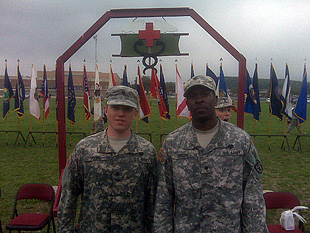U.S. Army Institute of Surgical Research Soldier earns the Coveted Expert Field Medical Badge

Photo by Sgt. Maj. Jeffrey Lavender
Photo by Sgt. Maj. Jeffrey Lavender
Forty-five Soldiers challenged themselves but, but only ten made it. Spc. Matthew Young of the U.S. Army Institute of Surgical Research was one of the ten Soldiers that were awarded prestigious EFMB at a ceremony April 2.
"For the past three weeks you have had the opportunity to be challenged ? physically, mentally, tactically and technically," said Maj. Gen. Russell Czerw, Commander, Fort Sam Houston and U.S. Army Medical Department Center & School. "I think you would agree that everything you have accomplished has helped you improve your medical skills," he said, addressing the Soldiers who received the EFMB. "Wear this badge with pride and honor; because you earned it."
The Expert Field Medical Badge was designed as a special skill award for recognition of exceptional competence and outstanding performance by field medical personnel and approved by the Department of the Army on 18 June 1965.
To earn the badge, Soldiers are tested on their knowledge of medical tasks with a comprehensive written exam which they must pass with a minimum score of 75%. Soldiers are also tested on their ability to navigate during the day and night. Next, they must demonstrate proficiency through hands-on evaluation in; Tactical Combat Casualty Care, performing at least 11 of 14 tasks correctly, Medical and Casualty Evacuation, performing at least eight of 10 tasks correctly, Communication Tasks, performing at least four of five tasks correctly and Warrior Skills, performing at least 10 of the 13 tasks correctly.
These hands-on evaluations have evolved over the years from station-to-station type testing to the method used today, realistic scenarios. All the hands on evaluations are distributed throughout three different scenarios and tested on Combat Testing Lanes. These scenarios more closely mirror the types of situations the Soldiers would find themselves in on today's battlefield.
Finally the event cumulates in testing the candidate's physical and mental toughness with a 12-mile foot march which must be completed within three hours.
"We started test week on 28 March with 45 candidates." said Sgt. 1st Class Ott, EFMB NCOIC. "The first event was the written test followed by all candidates negotiating the land navigation course. Thirty-one of the 45 candidates passed day land navigation and only 19 passed night land navigation."
Ott continued "Only two candidates failed lane testing" He attributed the exceptional lane testing results, 17 of 19 candidates (89.4%), to the additional week of training the host unit, the 32nd MED BDE, added prior to the event. Traditionally, the Soldier's unit prepared the candidate prior to attending EFMB testing.
Czerw also addressed the Soldiers who did not earn the badge, saying, "Understand that they call it the ?expert' and not the average. It is very difficult," he said, encouraging them to try again.
This was Young's first attempt at the EFMB, a task not easily completed. Only about 2% of all medical Soldiers have been awarded the EFMB. He is now a member of that elite group of medical Soldiers that hold the Expert Field Medical Badge!
 An official website of the United States government
An official website of the United States government
 ) or https:// means you've safely connected to the .mil website. Share sensitive information only on official, secure websites.
) or https:// means you've safely connected to the .mil website. Share sensitive information only on official, secure websites.


